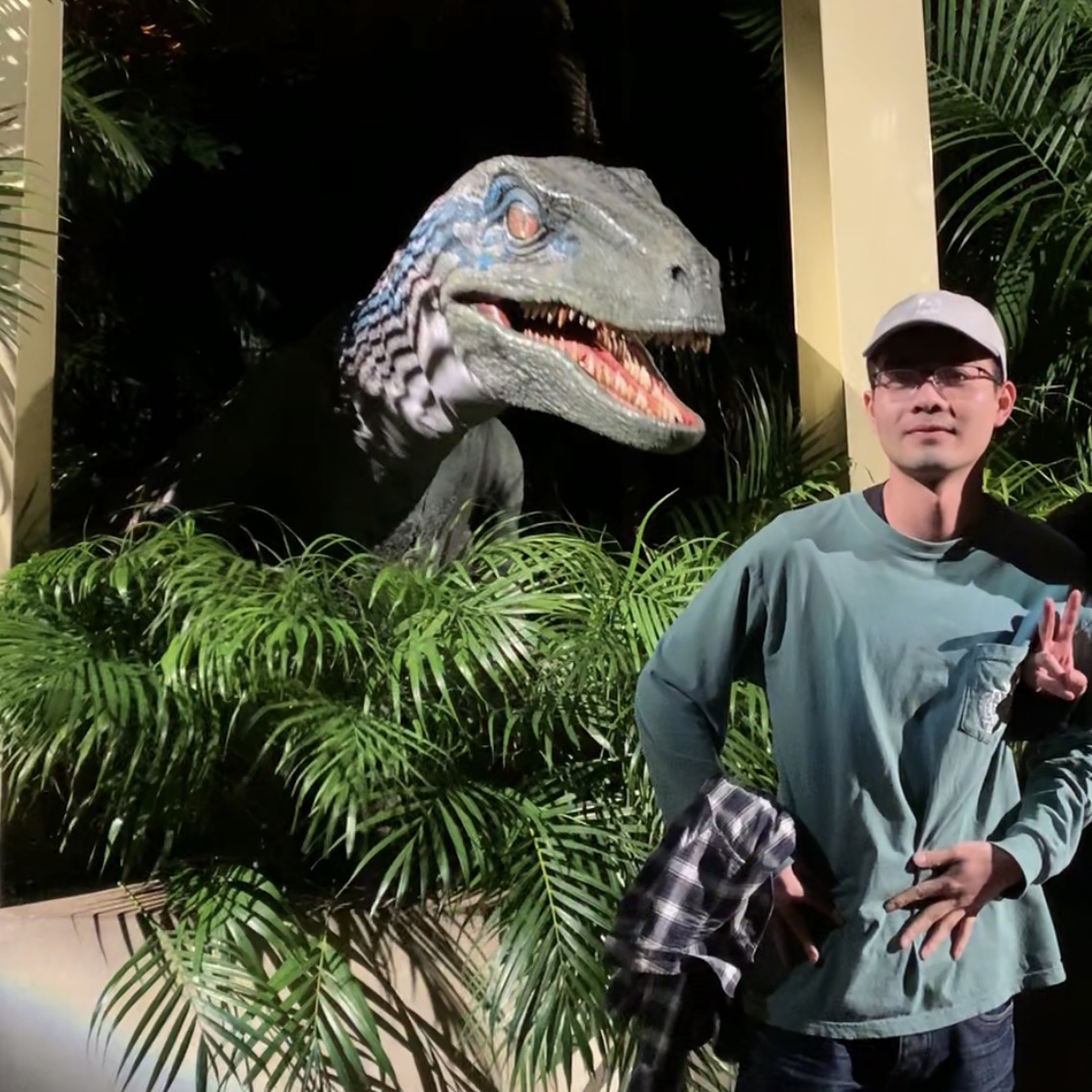
LinkedIn
| Scholar
| Vitae
zhexiong [at] cs.pitt.edu
Quote: The most beautiful thing we can experience is the mysterious. It is the source of all true
art and science. -- Albert Einstein
Hi, I received my Ph.D. in Computer Science at University of Pittsburgh. I worked with Prof. Diane Litman in PETAL Lab. I also received a master of science degree in Computer Science at Emory University and a bachelor degree in Computer Science and Technology at Sichuan University. Prior to my Ph.D. adventure, I was blessed to work with Prof. Jinho Choi in EmoryNLP Lab. Now I work at Microsoft.
I am passionate about using natural language processing (NLP) and large language models (LLMs) to build writing applications (e.g., automated writing evaluation, revision simulation with LLM agents). I am also interested in multimodal learning (e.g., visual question answering, multimodal argument mining) and interpretable machine learning (e.g., neuro-symbolic reasoning, adaptive meta-learning). I focus on using NLP and LLMs to solve challenging problems in education, science, and technology. Please feel free to email me at zhexiong [at] cs.pitt.edu if you are interested in a discussion or collaboration!
News
- 01/03/2026: A paper was accepted to EACL 2026 in Rabat, Morocco.
- 11/21/2025: I successfully defended my Ph.D. Dissertation!
- 08/20/2025: A paper was accepted to EMNLP 2025 in Suzhou, China.
- 03/26/2025: An abstract was accepted to MASC-SLL 2025 in State College, PA.
- 02/28/2025: A paper was accepted to NAACL 2025 in Albuquerque, NM.
- 02/18/2025: I presented our NAIRR Pilot Demo at Inaugural NAIRR Pilot Meeting 2025 in Washington, D.C.
- 10/26/2024: eRevise+RF Project has been piloted in Pennsylvania and Louisiana.
- 08/15/2024: I co-organized the ArgMining Workshop at ACL 2024 in Bangkok, Thailand.
- 06/28/2024: A paper was accepted to Radiology: Artificial Intelligence.
- 05/20/2024: I started my internship at Microsoft in Redmond, WA.
- 04/15/2024: A paper was accepted to the BEA Workshop at NAACL 2024 in Mexico City, Mexico.
- 01/22/2024: A chapter was accepted to Routledge International Handbook on Automated Essay Evaluation.
- 10/19/2023: A paper was accepted to the ArgMining Workshop at EMNLP 2023 in Singapore.
- 06/05/2023: I started my internship at Microsoft in Redmond, WA.
- 05/23/2023: A paper was accepted to the BEA Workshop at ACL 2023 in Toronto, Canada.
- 05/15/2023: I co-organized ImageArg Shared Task in the ArgMining Workshop at EMNLP 2023 in Singapore.
- 04/03/2023: A paper was accepted to Northern European Journal of Language Technology (NEJLT) 2023.
- 02/01/2023: I gave a talk in the Computational Linguistics group at University of Groningen in Netherlands.
- 11/19/2022: A paper was accepted to AAAI 2023 in Washington, D.C.
- 10/17/2022: ImageArg won Best Paper Award in the ArgMining Workshop at COLING 2022 in South Korea.
- 06/02/2022: A paper was accepted to MICCAI 2022 in Singapore.
- 05/10/2022: I started my internship at Microsoft in Redmond, WA.
- 06/19/2021: I presented our Poster Spotlight paper in the VQA Workshop at CVPR 2021.
- 05/16/2021: A paper was accepted to IoTAIMA 2021.
- 05/17/2021: I started my internship at Amazon Alexa Knowledge Team in Santa Barbara, CA.
- 05/14/2021: Great to join the 175th Emory Commencement for my graduation in Atlanta, GA.
- 05/31/2020: To-do Bar V2.0 that empowers MacOS menu bar was released.
Show more
Selected Projects

Intention-Adaptive LLM Fine-Tuning for Text Revision Generation
This project studies a novel LLM layer-wise multi-tasks learning framework that learns specific revision intentions through selected LLM layers, and then generate successful revisions using the layers that learned the intentions. It is a useful study to understand LLM layer's transferability from intention prediction to revision generation tasks.
[video] [paper] [slides] [poster] [code]
This project studies a novel LLM layer-wise multi-tasks learning framework that learns specific revision intentions through selected LLM layers, and then generate successful revisions using the layers that learned the intentions. It is a useful study to understand LLM layer's transferability from intention prediction to revision generation tasks.
[video] [paper] [slides] [poster] [code]
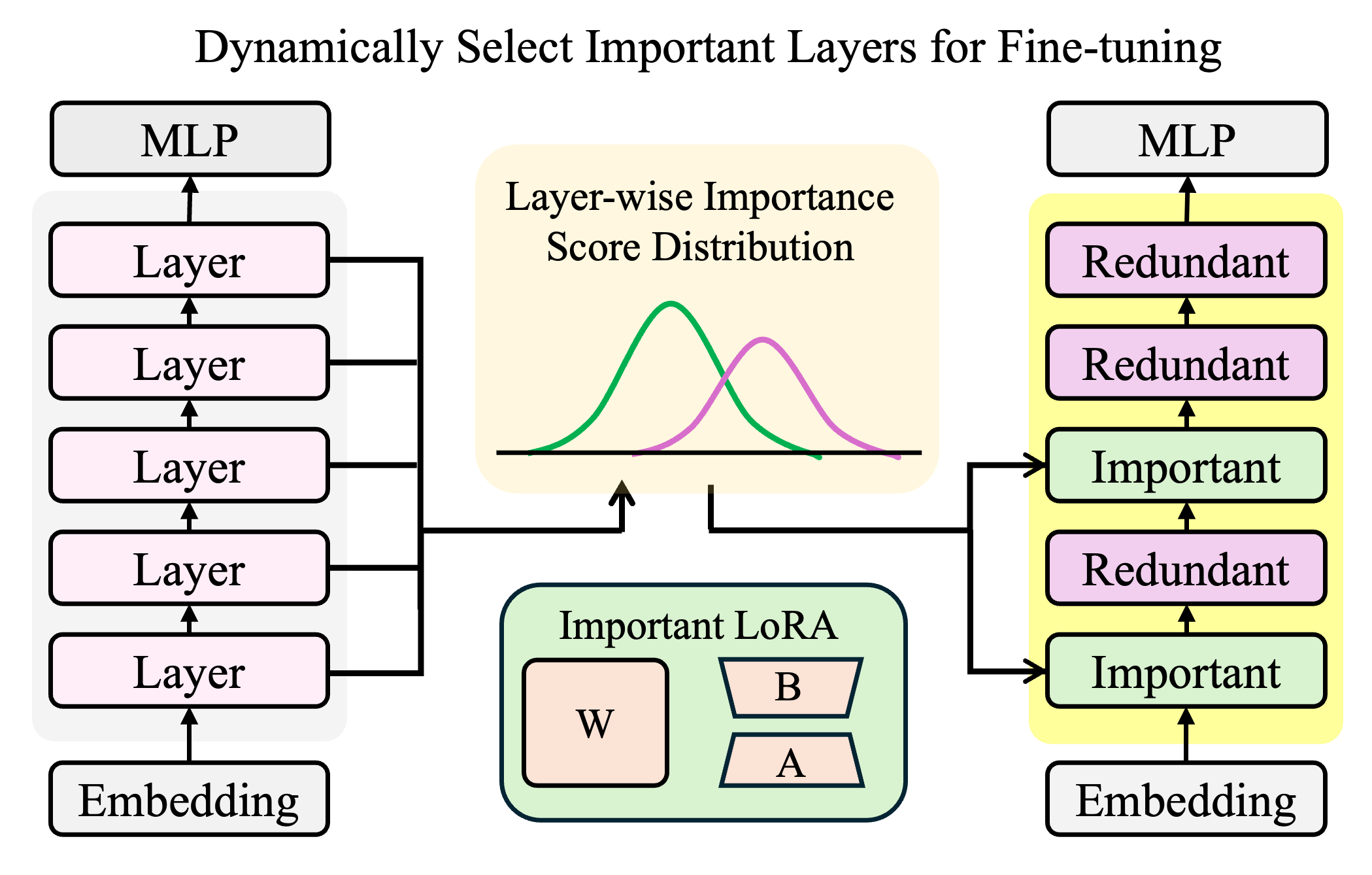
Efficient Layer-wise LLM Fine-tuning for Revision Intention Prediction
This project investigates a dynamic approach to fine-tuning large language models (LLMs) by selectively updating important layers while freezing redundant ones, which achieves fast fine-tuning convergence and requires low GPU allocations. It is the first work to introduce efficient layer-wise LLM fine-tuning in the revision community.
[video] [paper] [slides] [poster] [code]
This project investigates a dynamic approach to fine-tuning large language models (LLMs) by selectively updating important layers while freezing redundant ones, which achieves fast fine-tuning convergence and requires low GPU allocations. It is the first work to introduce efficient layer-wise LLM fine-tuning in the revision community.
[video] [paper] [slides] [poster] [code]
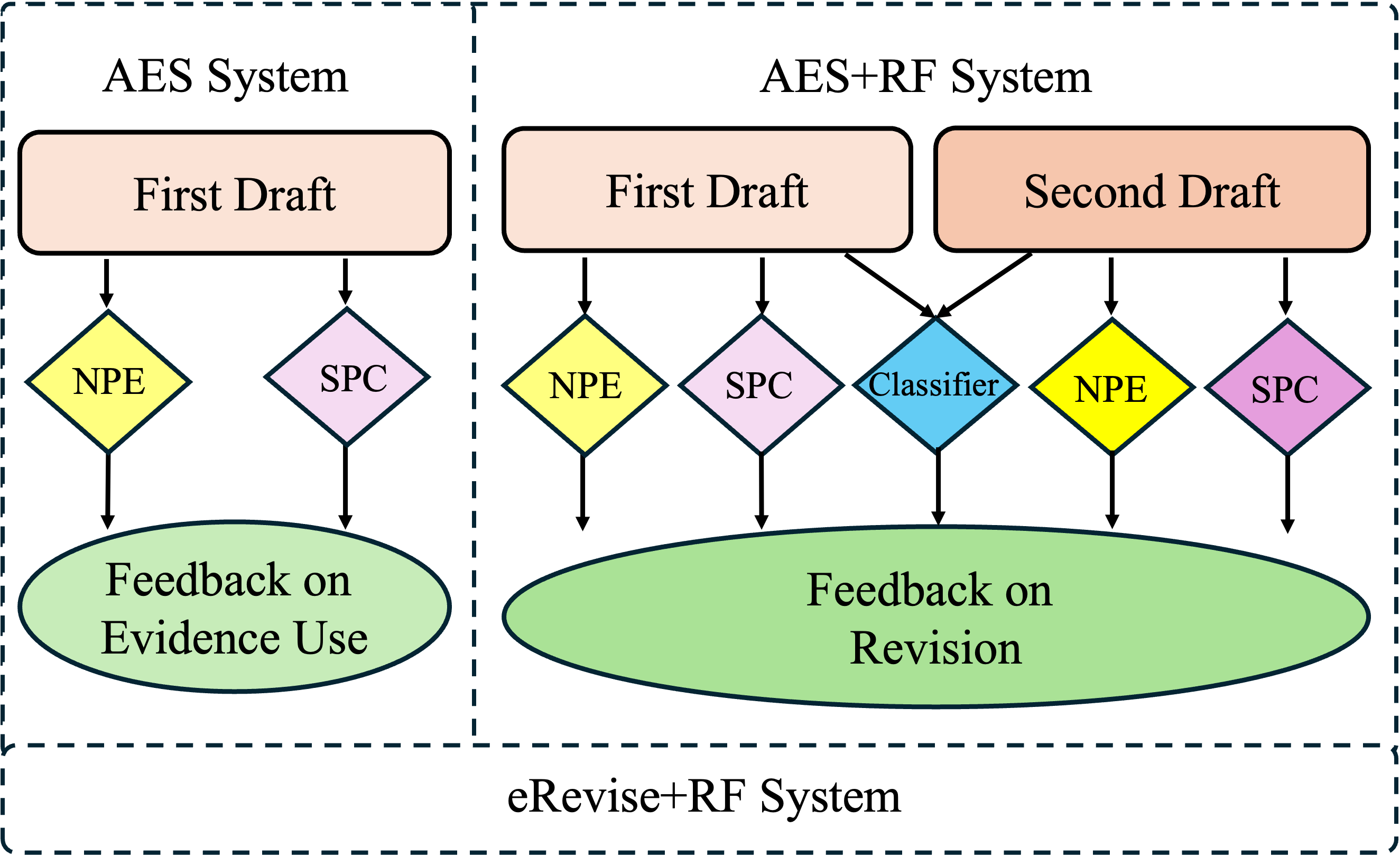
A System to Assess Student Essay Revisions and Provide Formative Feedback
This project presents eRevise+RF, an enhanced automated writing evaluation (AWE) system, to assess argumentative essay revisions and provide formative feedback on both evidence usage and revision success in response to feedback. It shows promise of using NLP to scaffold young students in writing and revising argumentative essays.
[video] [paper] [poster] [code] [system] [webpage] [news]
This project presents eRevise+RF, an enhanced automated writing evaluation (AWE) system, to assess argumentative essay revisions and provide formative feedback on both evidence usage and revision success in response to feedback. It shows promise of using NLP to scaffold young students in writing and revising argumentative essays.
[video] [paper] [poster] [code] [system] [webpage] [news]
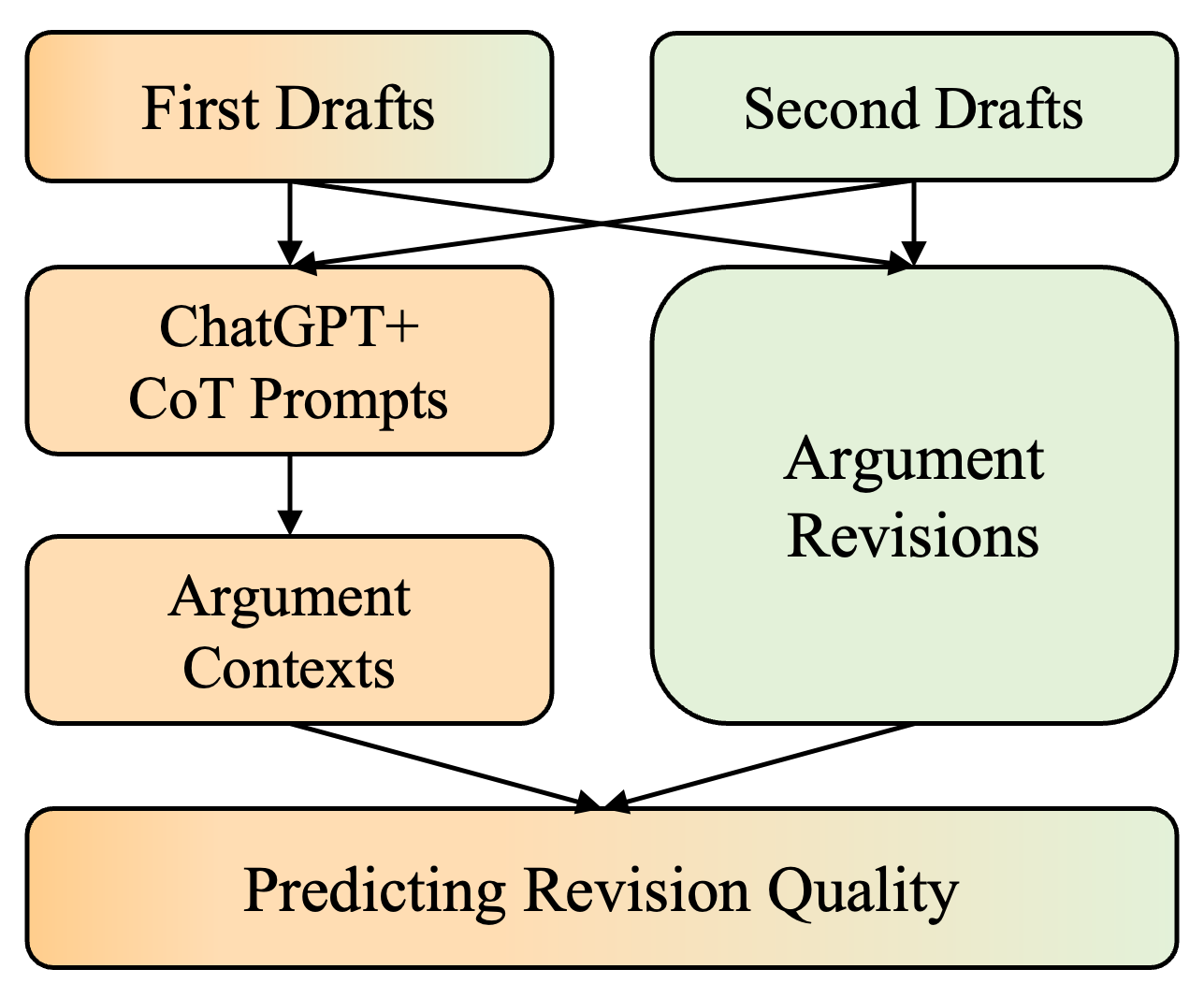
Predicting the Quality of Revisions in Argumentative Writing
This project studies the relationship between argument contexts (ACs) and argument revisions (ARs) in argumentative writing. It leverages Chain-of-Thought prompts to facilitate ChatGPT to generate ACs for distinguishing between successful and unsuccessful ARs. It opens a promising avenue in revision research.
[video] [paper] [slides] [poster] [code]
This project studies the relationship between argument contexts (ACs) and argument revisions (ARs) in argumentative writing. It leverages Chain-of-Thought prompts to facilitate ChatGPT to generate ACs for distinguishing between successful and unsuccessful ARs. It opens a promising avenue in revision research.
[video] [paper] [slides] [poster] [code]
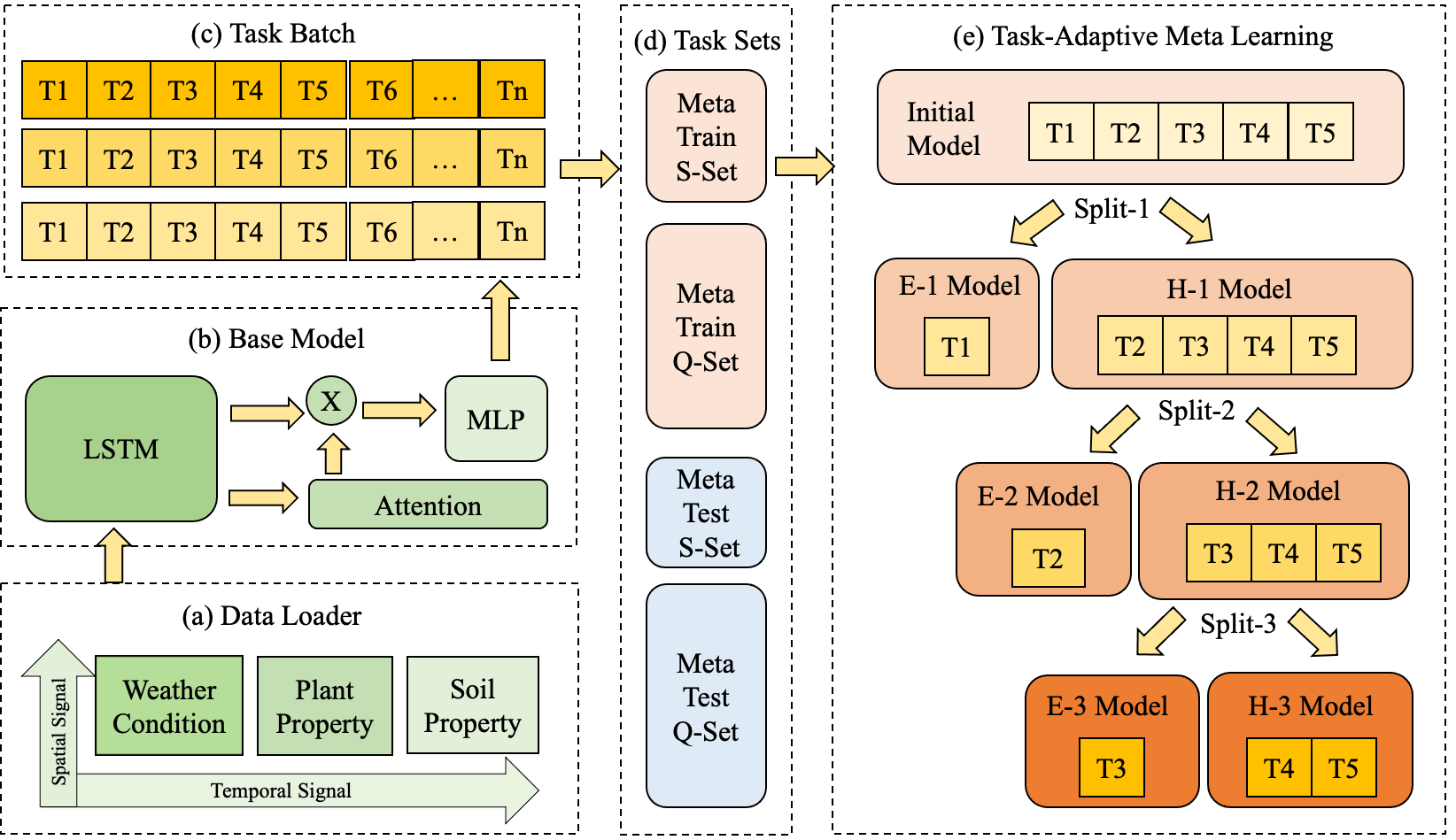
Task-Adaptive Meta-Learning Framework for Advancing Spatial Generalizability
This project proposes a model-agnostic meta-learning framework that integrates geographically heterogeneous data into region-sensitive meta tasks using an easy-to-hard task hierarchy. It enables models to adapt to numerous heterogeneous tasks, significantly improving their generalizability.
[video] [paper] [slides] [poster] [code]
This project proposes a model-agnostic meta-learning framework that integrates geographically heterogeneous data into region-sensitive meta tasks using an easy-to-hard task hierarchy. It enables models to adapt to numerous heterogeneous tasks, significantly improving their generalizability.
[video] [paper] [slides] [poster] [code]
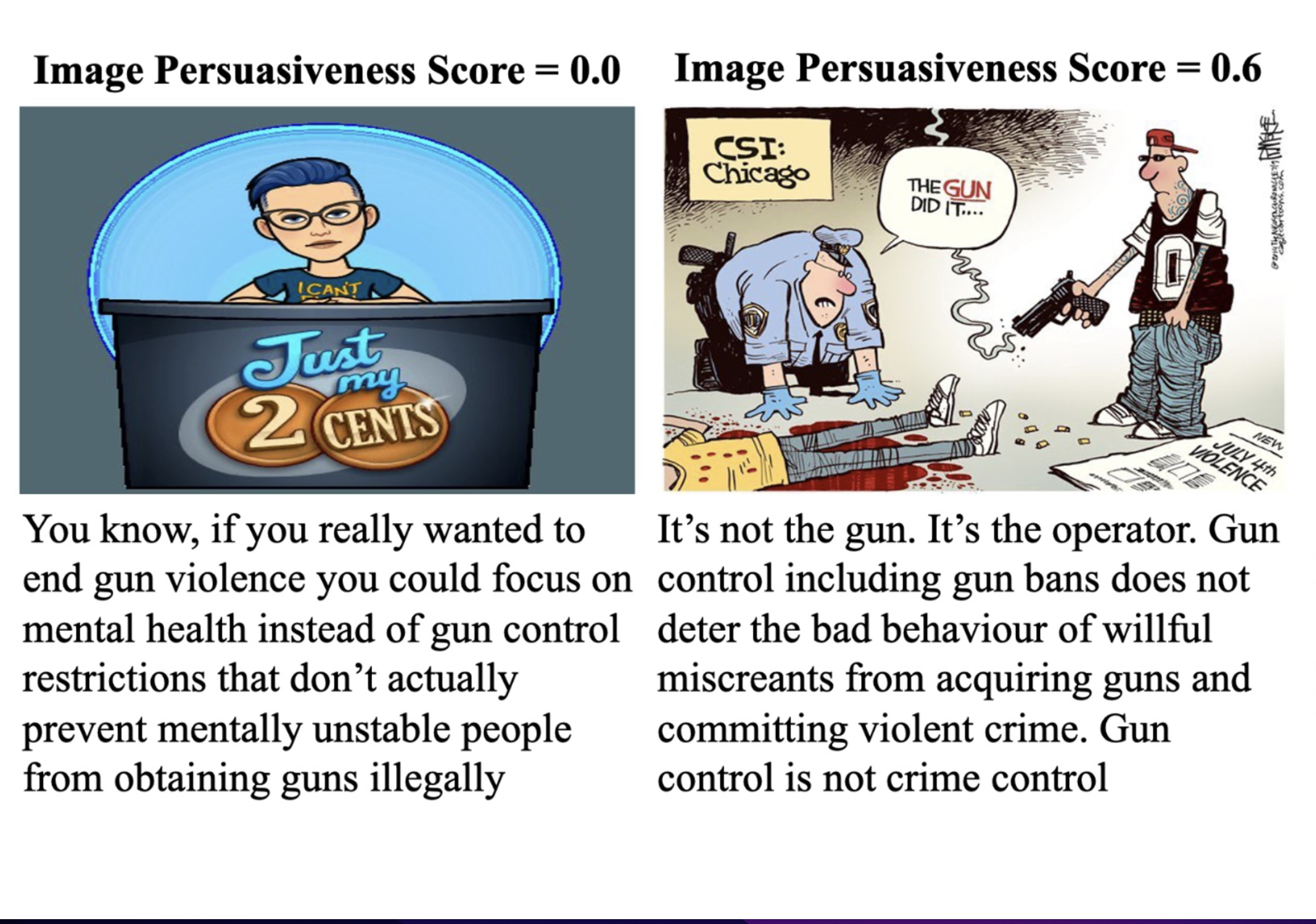
ImageArg: A Multi-modal Tweet Dataset for Image Persuasiveness Mining
This project develops a multimodal dataset featuring annotation on the persuasiveness of tweet images. The annotation is based on a persuasion taxonomy developed to explore image functionalities and the means of persuasion. The ImageArg wins Best Paper Award in the 9th ArgMining Workshop.
[video] [paper] [slides] [code] [shared task] [news]
This project develops a multimodal dataset featuring annotation on the persuasiveness of tweet images. The annotation is based on a persuasion taxonomy developed to explore image functionalities and the means of persuasion. The ImageArg wins Best Paper Award in the 9th ArgMining Workshop.
[video] [paper] [slides] [code] [shared task] [news]
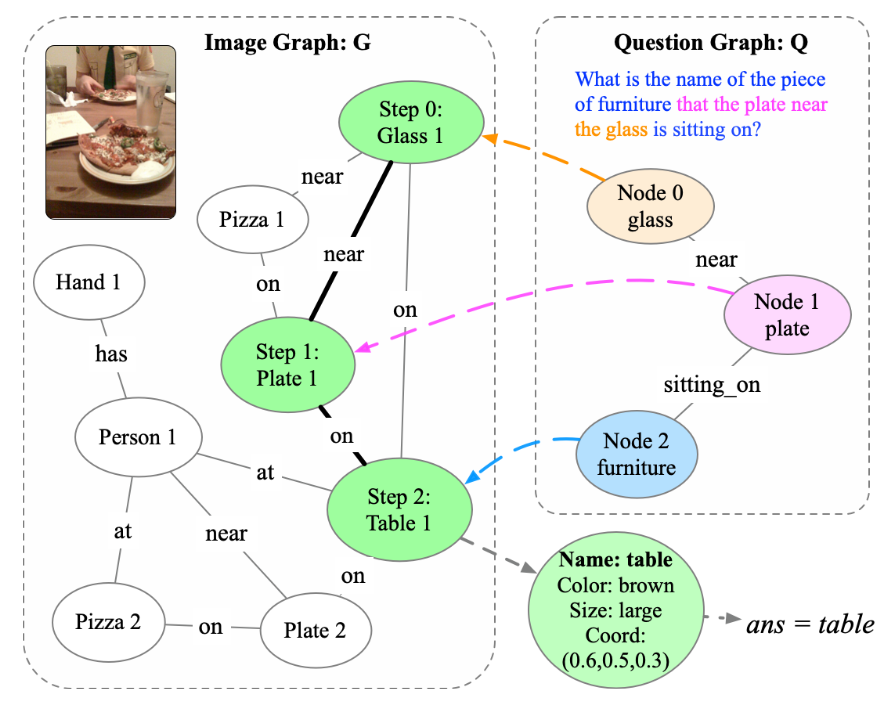
Graph-Symbolic VQA with Rich Visual Estimators and No QA Labels
This project proposes a graph-symbolic framework that mimics human reasoning through a three-stage graph-based approach: image graph construction, question graph construction, and answering based on symbols in the two graphs. It requires no question-answer labels and can be applied to new domains without data annotation.
[video] [paper] [slides] [poster]
This project proposes a graph-symbolic framework that mimics human reasoning through a three-stage graph-based approach: image graph construction, question graph construction, and answering based on symbols in the two graphs. It requires no question-answer labels and can be applied to new domains without data annotation.
[video] [paper] [slides] [poster]
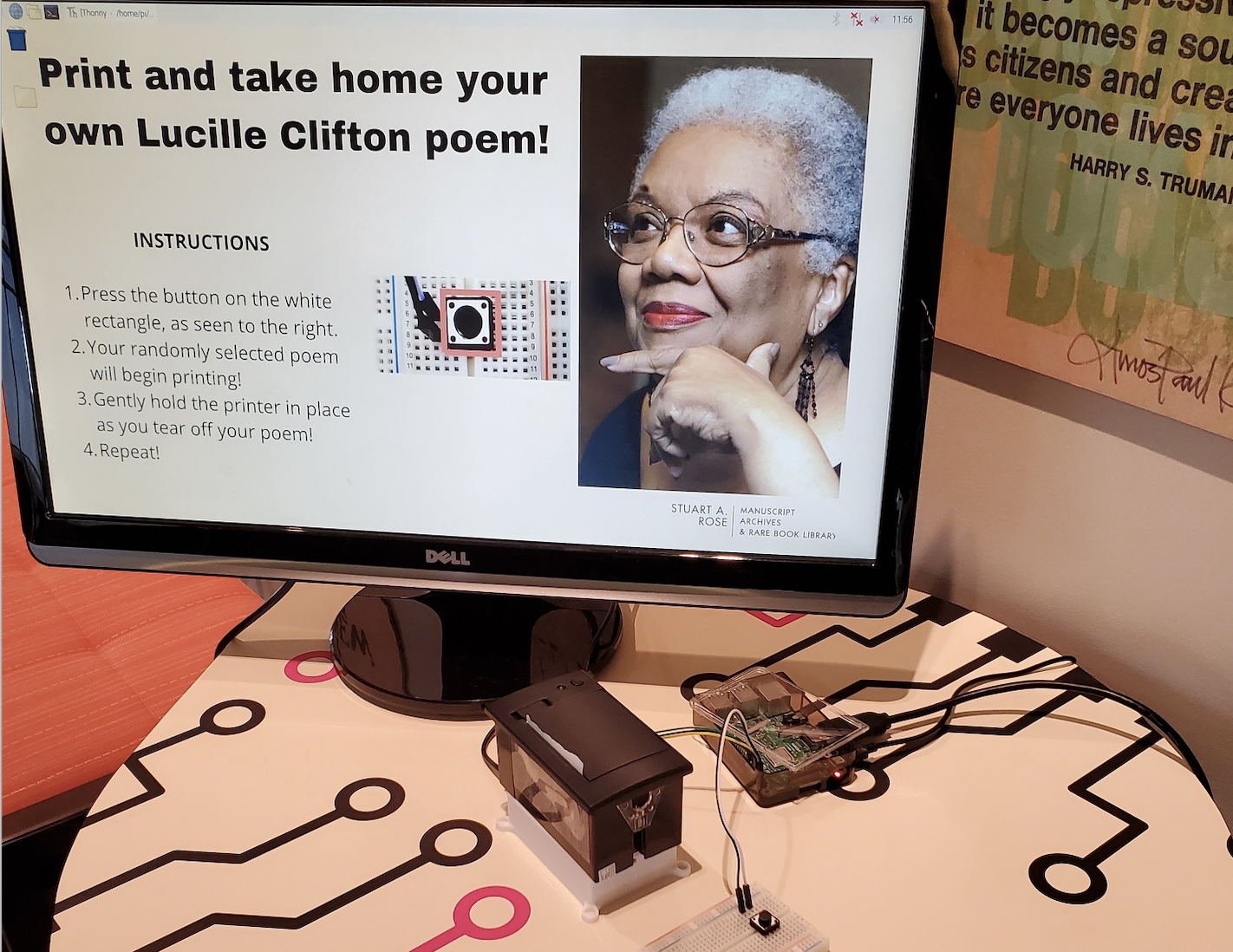
Reviving Literary Heritage Using RaspberryPi
This project presents a compact retriever system built on RaspberryPi that retrieves and prints archived poems. With a simple press of a button on the RaspberryPi board, users can effortlessly access a carefully curated poem. It showcases a seamless integration of art and science to reconnect audiences with literary heritage.
[news]
This project presents a compact retriever system built on RaspberryPi that retrieves and prints archived poems. With a simple press of a button on the RaspberryPi board, users can effortlessly access a carefully curated poem. It showcases a seamless integration of art and science to reconnect audiences with literary heritage.
[news]
Selected Publication
- Zhexiong Liu and Diane Litman. Intention-Adaptive LLM Fine-Tuning for Text Revision Generation. Findings of The Conference of the European Chapter of the Association for Computational Linguistics (EACL), March 2026.
- Tianwen Li, Lindsay Clare Matsumura, Elaine Wang, Diane Litman, Zhexiong Liu, Richard Correnti. AI-Assisted Evaluation of Revision Patterns in Young Students' Argument Writing. Frontiers in Education, January 2026.
- Zhexiong Liu and Diane Litman. Efficient Layer-wise LLM Fine-tuning for Revision Intention Prediction. Findings of The Conference on Empirical Methods in Natural Language Processing (EMNLP), November 2025.
- Tianwen Li, Michelle Hong, Lindsay Clare Matsumura, Elaine L Wang, Diane Litman, Zhexiong Liu, Richard Correnti. Chain-of-Thought Prompting for Automated Evaluation of Revision Patterns in Young Student Writing. Proceedings of The Artificial Intelligence in Measurement and Education Conference (AIME), October 2025.
- Tianwen Li, Lindsay Clare Matsumura, Elaine L Wang, Zhexiong Liu, Diane Litman, Richard Correnti. Designing Writing Feedback with Large Language Models: Developing Young Adolescents' Conceptual Understanding of Effective Revision. Proceedings of The International Society of the Learning Sciences (ISLS) Annual Meeting, June 2025 (Poster).
- Zhexiong Liu, Diane Litman, Elaine L Wang, Tianwen Li, Mason Gobat, Lindsay Clare Matsumura, Richard Correnti. eRevise+RF: A Writing Evaluation System for Assessing Student Essay Revisions and Providing Formative Feedback. Proceedings of The Nations of the Americas Chapter of the Association for Computational Linguistics (NAACL) (System Demonstration), April 2025.
- Tianwen Li, Lindsay Clare Matsumura, Elaine L Wang, Diane Litman, Richard Correnti, Zhexiong Liu. Leveraging large language models to fostering young students' metacognition of revision. In American Educational Research Association (AERA) Annual Conference, April 2025. (Abstract)
- Elaine L Wang, Lindsay Clare Matsumura, Zhexiong Liu, Tianwen Li, Richard Correnti, Diane Litman. Elementary Students’ Revision Moves in Text-Based Argument Essay Writing: A Corpus Study. In American Educational Research Association (AERA) Annual Conference, April 2025 (Round Table).
- Yamen Ajjour, Roy Bar-Haim, Roxanne El Baff, Zhexiong Liu, Gabriella Skitalinskaya. The 11th Workshop on Argument Mining. Proceedings of The 11th Argument Mining Workshop, held in conjunction with The Association for Computational Linguistics (ACL), August 2024. (Editor)
- Ke Yu, Shantanu Ghosh, Zhexiong Liu, Christopher Deible, Clare B. Poynton, Kayhan Batmanghelich. Anatomy-specific Progression Classification in Chest Radiographs via Weakly Supervised Learning. Radiology: Artificial Intelligence, July 2024.
- Tianwen Li, Zhexiong Liu, Lindsay Clare Matsumura, Elaine L Wang, Diane Litman, Richard Correnti. Using Large Language Models to Assess Young Students' Writing Revisions. Proceedings of The 19th Workshop on Innovative Innovative Use of NLP for Building Educational Applications (BEA), held in conjunction with The North American Chapter of the Association for Computational Linguistics (NAACL), June 2024.
- Richard Correnti, Elaine L Wang, Lindsay Claire Matsumura, Diane Litman, Zhexiong Liu, Tianwen Li. Supporting Students’ Text-based Evidence Use via Formative Automated Writing and Revision Assessment. The Routledge International Handbook of Automated Essay Evaluation, June 2024.
- Zhexiong Liu, Jing Zhang, Jiaying Lu, Wenjing Ma, Joyce Ho. LogicPrpBank: A Corpus for Logical Implication and Equivalence. Proceedings of The 5th Artificial Intelligence for Education Workshop, held in conjunction with The 38th AAAI Conference on Artificial Intelligence (AAAI-24), February 2024.
- Zhexiong Liu, Cris Benge, Yash Dagli, Siduo Jiang. STIM: Predicting Memory Uncorrectable Errors with Spatio-Temporal Transformer. Proceedings of Microsoft Journal of Applied Research (MSJAR), January 2024.
- Zhexiong Liu, Mohamed Elaraby, Yang Zhong, Diane Litman. Overview of ImageArg-2023: The First Shared Task in Multimodal Argument Mining. Proceedings of The 10th Argument Mining Workshop, held in conjunction with the Conference on Empirical Methods in Natural Language Processing (EMNLP), December 2023.
- Zhexiong Liu, Diane Litman, Elaine L Wang, Lindsay Clare Matsumura and Richard Correnti. Predicting the Quality of Revisions in Argumentative Writing. Proceedings of The 18th Workshop on Innovative Innovative Use of NLP for Building Educational Applications (BEA), held in conjunction with The Association for Computational Linguistics (ACL), July 2023.
- Zhexiong Liu as part of Authors. NL-Augmenter: A Framework for Task-Sensitive Natural Language Augmentation. Proceedings of Northern European Journal of Language Technology (NEJLT), April 2023.
- Zhexiong Liu, Licheng Liu, Yiqun Xie, Zhenong Jin, Xiaowei Jia. Task-Adaptive Meta-Learning Framework for Advancing Spatial Generalizability. Proceedings of The Thirty-Seventh AAAI Conference on Artificial Intelligence (AAAI-23), May 2023.
- Zhexiong Liu, Cris Benge, Stone Jiang. Ticket-BERT: Labeling Incident Management Tickets with Language Models. Proceedings of Microsoft Journal of Applied Research (MSJAR), January 2023.
- Zhexiong Liu*, Meiqi Guo*, Yue Dai* and Diane Litman. (*equal contribution) ImageArg: A Multi-modal Tweet Dataset for Image Persuasiveness Mining. Proceedings of The 9th Argument Mining Workshop, held in conjunction with the International Conference on Computational Linguistics (COLING), October 2022. (Best Paper Award)
- Ke Yu, Shantanu Ghosh, Zhexiong Liu, Christopher Deible, Kayhan Batmanghelich. Anatomy-Guided Weakly Supervised Abnormality Localization in Chest X-rays. Proceedings of Medical Image Computing and Computer Assisted Intervention (MICCAI), September 2022.
- Zhexiong Liu and Adriana Kovashka. Graph-Symbolic VQA with Rich Visual Estimators and No Question-Answer Labels. In Visual Question Answering Workshop, held in conjunction with the IEEE/CVF Conference on Computer Vision and Pattern Recognition (CVPR), June 2021. (Poster Spotlight)
- Hanzhong Zheng, Zhexiong Liu, Dejia Shi. Image-text Discourse Coherence Relation Discoveries on Multi-image and Multi-text Documents. Proceedings of International Conference on Internet of Things, Artificial Intelligence and Mechanical Automation (IoTAIMA), June 2021.
2026
2025
2024
2023
2022
2021
Experience
- 2025 to present: Data & Applied Scientist II, Microsoft
Work on LLM solutions to challenging CS problems - 2022 to 2025: Research Assistant, Pitt PETAL Lab
Work with Prof. Diane Litman - 2024 to 2024: Data & Applied Scientist Intern, Microsoft
Worked with Srinivasa Madati, Yash Dagli, and Stone Jiang - 2023 to 2023: Data & Applied Scientist Intern, Microsoft
Worked with Yash Dagli, Stone Jiang, and Cris Benge - 2022 to 2022: Data & Applied Scientist Intern, Microsoft
Worked with Stone Jiang, Andrew Fogarty, Jason Tongarm, and Cris Benge - 2021 to 2021: Applied Scientist Intern, Amazon Alexa
Worked with Nic Jedema, Manish Gupta, and Ruben Janssen - 2020 to 2021: Graduate Student, Pitt Computer Vision Lab
Worked with Prof. Adriana Kovashka - 2019 to 2020: Research Assistant, Emory NLP Lab
Worked with Prof. Jinho Choi - 2018 to 2019: Graduate Assistant, Emory Rose Library
Worked with Brenna Edwards -
2016 to 2018: Algorithm Engineer, Calabar Information Technology
Worked on machine learning & data mining projects
Show more
Education
- 2020 to 2025: Ph.D. in Computer Science, University of Pittsburgh
- 2021 to 2023: Visiting Student, Cross Registration, Carnegie Mellon University
- 2018 to 2020: Master of Science in Computer Science, Emory University
- 2012 to 2016: Bachelor of Engineering in Computer Science & Technology, Sichuan University
Teaching
- Human Language Technologies (CS1671, Fall 2021), University of
Pittsburgh
Worked with Prof. Diane Litman - Introduction to Natural Language Processing (CS2731, Fall
2021), University of
Pittsburgh
Worked with Prof. Malihe Alikhani - Operating Systems (CS1550, Spring 2021), University of
Pittsburgh
Worked with Dr. Sherif Khattab - Introduction to Computing for Scientist (CS0011, Spring 2021),
University of
Pittsburgh
Worked with Dr. Paulo Ferreira and Matt Barbosa - Algorithm Implementation (CS1501, Fall 2020, Spring 2022),
University of
Pittsburgh
Worked with Dr. Nicholas Farnan and Dr. Sherif Khattab - Introduction to Statistic Inference (QTM 100, Spring
2020 & Fall 2019),
Emory University
Worked with Dr. Hojin Kim - Theory of Computing (CS424/CS524, Spring 2020), Emory
University
Worked with Prof. Michelangelo Grigni - Graduate Algorithms (CS526, Fall 2019), Emory University
Worked with Prof. Michelangelo Grigni - Mathematics for Quantitative Sciences (QTM 120, Spring
2019), Emory University
Worked with Prof. Frederic Bien
Show more
Student Supervision
- Mason Gobat (CS Undergraduate Student)
Academic Service
- Organizer: The 11th ArgMining Workshop at ACL 2024 in Bangkok, Thailand
- ImageArg Shared Task in the 10th ArgMining Workshop at EMNLP 2023 in Singapore
- Reviewer: AAAI 2026, EACL 2026, ACL-W 2026, EDM 2026, AAAI 2025, ACL 2025, EMNLP 2025
- NAACL 2025, AACL 2025, EDM 2025, ACL-W 2025, CVPR-W 2025, AAAI 2024, ACL 2024, EMNLP 2024
- EDM 2024, NAACL-W 2024, CVPR-W 2024, AAAI 2023, ACL 2023, ACL-W 2023, EMNLP-W 2023
- CVPR-W 2023, CVPR-W 2022
- Student Volunteer: NAACL 2025, AAAI 2024, AAAI 2023, ACL 2023, COLING 2022
Leadership and Community Engagement
- 2024 to 2024: Graduate Mentor, Department of Computer Science, University of Pittsburgh
- 2022 to 2023: Committee Member, SCI Academic Council, University of Pittsburgh
- 2022 to 2022: Graduate Mentor, Graduate Global Ties Mentor Program, University of Pittsburgh
- 2020 to 2020: Project Mentor, CMU VentureWell Hackathon, Carnegie Mellon University
- 2020 to 2020: Volunteer and Instructor, Senior Citizens Digital Literacy Program, University of Pittsburgh
- 2019 to 2019: Volunteer and Mentor, Emory DataFest Hackathon, Emory University
- 2018 to 2019: Graduate Assistant and Project Developer, Stuart A. Rose Library, Emory University
Selected Awards
- 2026, 2025: National Artificial Intelligence Research Resource Pilot Travel Support
- 2025, 2023: Association for Computational Linguistics Student Travel Award
- 2025, 2023: Learning Research and Development Center GSC Award
- 2025, 2023, 2022: Department of Computer Science Travel Award at PITT
- 2024, 2023: Association for Advancement of Artificial Intelligence Student Scholarship
- 2023: Graduate and Professional Student Government Travel Award at PITT
- 2022: Best Paper Award in the 9th Argument Mining Workshop at COLING
- 2022: International Conference on Computational Linguistics Student Travel Award
- 2020, 2019, 2018: Faculty (Half-Tuition) Scholarship at Emory University
- 2016: Honors Undergraduate Thesis Program at Sichuan University
- 2016: Honorable Mention at Mathematical Contest in Modeling (MCM)
- 2015: The 3rd Prize at National College Mathematics Competition (CMC)
- 2015: Science and Technology Innovation Award at Sichuan University
- 2015, 2014, 2013: Sichuan University Merit Scholarship
Show more
Miscellaneous
- I spent wonderful years in Sichuan (Szechuan). I enjoy spicy Szechuan cuisine.
- I like painting and photographs and some quotes.
Contact
- Zhexiong Liu, he/him/his
- Email: zhexiong [at] cs.pitt.edu
- Mailing Address:
Department of Computer Science
6117 Sennott Square
University of Pittsburgh
Pittsburgh, PA 15260 USA